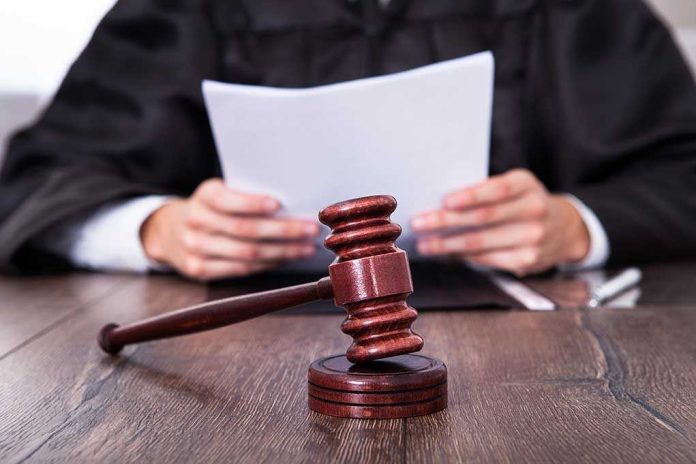
When a top Iowa judge faces criminal charges after being found unconscious behind the wheel, Americans must question if the justice system protects its own while endangering the public.
Story Snapshot
- A chief judge in Iowa was found heavily intoxicated and driving the wrong way on a major highway, prompting civilian intervention and her arrest.
- The incident exposes deep concerns about judicial accountability, as multiple officials recused themselves due to conflicts of interest.
- Procedural safeguards and special appointments are underway, but public trust in the judiciary faces renewed scrutiny.
- This case spotlights the broader issue of whether elites are held to the same legal standards as ordinary Americans.
Alarming Judicial Conduct Puts Public at Risk
Shortly after 8 p.m. on a recent Tuesday, motorists in Boone, Iowa, witnessed a disturbing scene: a truck traveling the wrong way on U.S. Highway 30. Multiple 911 calls reported the driver, later identified as Adria Kester, chief judge of Iowa’s Second Judicial District, slumped unconscious over the wheel. A courageous civilian intervened, entering the vehicle to bring it to a halt and prevent disaster. Law enforcement arrived to find Kester heavily intoxicated and unable to walk unaided. She was promptly arrested and charged with first offense OWI. The immediate threat to public safety, combined with Kester’s high-ranking status, has ignited outrage over the state of judicial accountability.
Judicial Privilege and the Challenge of Accountability
Kester’s position places her among the most influential figures in Iowa’s legal system, overseeing hundreds of court employees and judges. Her arrest underscores a persistent question: are elites in the justice system held to the same standards as the rest of the nation? The incident required the recusal of local judges and prosecutors due to close professional relationships, highlighting the inherent conflicts that arise when powerful officials are accused of serious wrongdoing. The Iowa Judicial Qualifications Commission, responsible for maintaining standards, is expected to review the case, but the process raises concerns about transparency and impartiality. For Americans who have watched double standards undermine faith in institutions, this episode is both infuriating and sadly familiar.
After her arrest, Kester was released without bond following a court appearance and ordered to undergo substance abuse evaluation within 30 days. Judge Gregory Brandt, from another district, was appointed to preside. The Polk County Attorney’s Office stepped in as special prosecutor after Boone County officials recused themselves. These procedural steps are intended to avoid conflicts of interest, but they also illustrate how complex and opaque justice becomes when insiders are involved. The Iowa Judicial Branch has declined to comment, citing ongoing personnel matters; Kester herself has made no public statement. This silence only fuels suspicion that the system shields its own from real consequences.
Broader Impact on Public Trust and Legal Integrity
Events like this have far-reaching implications. In the short term, judicial operations in Iowa’s Second Judicial District face major disruption. The public, meanwhile, is left to wonder whether justice will truly be served—or if yet another official will escape meaningful accountability. For years, conservatives have warned about the dangers of unchecked power among elites, whether in Washington or the courts. The Kester case is a stark reminder of why robust oversight, transparency, and adherence to the rule of law are essential to preserving American liberty. If the system bends to protect its own, it erodes the very foundation of trust that underpins our constitutional republic.
Long-term, this case could set a precedent for how similar incidents are handled nationwide. It might prompt reforms in judicial discipline and recusal procedures, especially if the public continues to demand equal justice regardless of status. The social debate over substance abuse and official accountability is likely to intensify. Economic costs associated with special prosecution and investigations will be borne by taxpayers, further fueling frustration with government overreach and perceived waste. For many, the real issue is simple: Americans want a justice system that protects the innocent, punishes the guilty, and never favors the powerful over the people.
Expert analysis from legal scholars underscores the need for impartial proceedings and strict recusal protocols in cases involving judicial officers. While some urge patience as the facts come out, others argue for greater transparency and oversight to restore public faith. What remains clear is that stories like this reinforce why vigilance and accountability are non-negotiable values for conservatives who believe in law and order. As the Trump administration continues to prioritize constitutional principles and the rule of law, Americans are reminded that no one—not even a chief judge—is above accountability.
Sources:
Iowa judge facing OWI charge after driving wrong way, found unconscious – AOL News
What happens after you get arrested for OWI in Wisconsin? – NGLawyers.com
Iowa judge charged with OWI after found unconscious driving wrong way – AOL News











